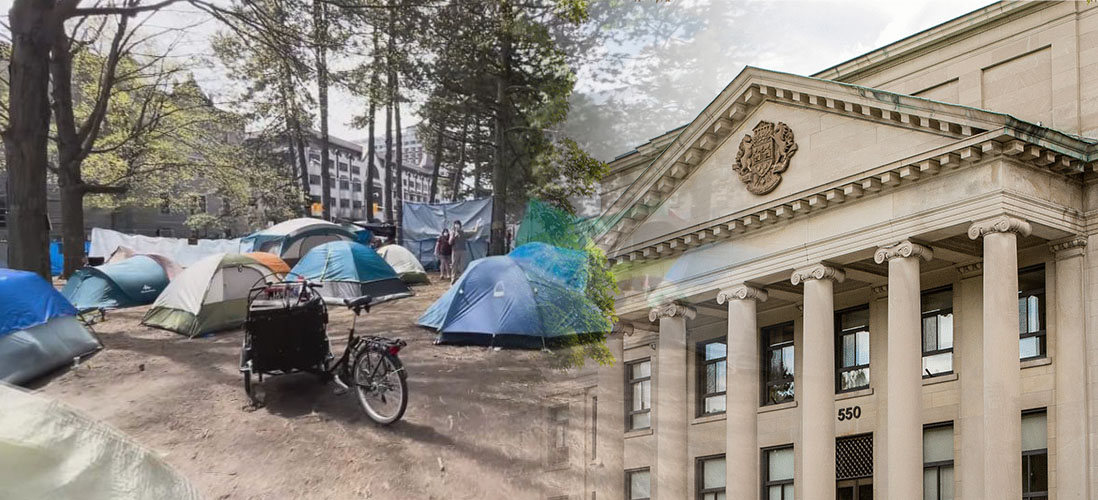
Leadership in Crisis: Jacques Frémont’s Failure to Address Antisemitism at uOttawa
Hillel Ottawa is reaching out to the broader national capital region community for support to counter the rising antisemitism at the University of Ottawa campus. Despite meeting with uOttawa president last week, the pro-Palestinian/Hamas encampment continues.
Hillel Executive Director Jamie Sweigman said in a statement released to media that there are “serious concerns about the safety and well-being of Jewish students”. Ottawa Police report that Jews are the top target of hate crimes in the city, constituting 76 percent of reported religiously motivated cases, despite representing only 1.1 percent of the population. This troubling statistic is underscored by recent incidents, including charges against two Ottawa minors for a bomb plot targeting the Jewish community.
The encampment at uOttawa, led by various student groups, has exacerbated these fears. Language and symbols supporting terrorism, particularly in favour of Hamas, have been prominently displayed. Sanctioned student groups at both the University of Ottawa and Carleton University have distributed materials featuring bombs, guns, terrorists, and the hang-glider symbol associated with the October 7 Hamas attack. “This creates a traumatic environment for Jewish students,” says the statement from Hillel.
The ripple effect of such rhetoric is being felt nationwide. In Montreal and Toronto, Jewish schools have been shot at, while a synagogue in Vancouver was firebombed. Words indeed have consequences, and the escalation of antisemitic sentiment since October 7 is alarming. Hillel Ottawa has also reported an unprecedented number of antisemitic incidents at the University of Ottawa and Carleton University involving students, campus clubs, and professors.
Several groups have been identified as part of the encampment at the University of Ottawa, including:
• INSAF: A university club openly supporting Hamas and its actions on October 7.
• Palestinian Youth Movement: Known for supporting terrorism, including the October 8 rally on Elgin Street in favour of Hamas.
• Ottawa4Palestine: Members have been arrested at recent protests and involved in the swarming attack on a Jewish man leaving a Muslim friendship dinner.
• Students for Justice in Palestine (SJP): Led a press conference at the encampment where Jewish student observers were harassed.
Voices from the Campus
Jewish students continue to express their fears and frustrations as the encampments at uOttawa continue to be a source of fear and anxiety for Jewish students. Oren Baray, an undergraduate student at Ottawa, says, “The signs and language from the encampment have been in clear support of terrorism, and that is terrifying.” He added that “the encampment at uOttawa makes me feel so anxious. I’m a visibly Jewish person, and I’ve been avoiding the uOttawa campus and the entire area because I’m afraid of getting harassed or hurt for being Jewish. It is so unfair that Jewish students and Jewish people have to be scared to simply exist. Jewish students should feel safe on their campus. Period.” Chani, a graduate student at Ottawa, said, “It is enraging to see students displaying hateful language and misinformation on campus regarding our friends, families and Jews around the world without any action being taken to protect Jewish students.” – Gabs, an undergraduate student at Carleton said “A lot of my friends have been singled out and verbally and physically attacked while walking by when they’ve just been on their way to work or to class. The students at the encampment aren’t pro-peace; they actively engage in hatred and extremist behaviour and are unwilling to engage in meaningful, productive dialogue.” A.H., an undergraduate student at Carleton, said the situation at the University of Ottawa is a microcosm of a larger issue facing Jewish communities across Canada.
On June 10, University of Ottawa President and Vice-Chancellor Jacques Frémont (who is a former Dean of the Faculty of Law and Professor of Constitutional Law and Human Rights at Université de Montreal) issued a rambling President’s statement to the Senate on the campus encampment that was full of contradictions.
Frémont emphasized the University’s commitment to freedom of expression since October 7, allowing various demonstrations related to the Israel-Hamas conflict. However, he admitted there are limits to these freedoms, including the right to safety and security. Despite clear evidence of Hamas supporters in the encampment, Frémont’s statement failed to acknowledge this and instead offered vague proposals such as considering human rights issues in the University’s holdings and setting up scholarships for Palestinian students. He did not mention Jewish students once in the statement.
Frémont has done nothing to protect Jewish students under threat. Canadian law clearly delineates the boundaries of freedom of expression. The Criminal Code of Canada prohibits hate speech, defined as any communication that incites hatred against any identifiable group where such incitement is likely to lead to a breach of the peace. The encampment at uOttawa, with its open support for Hamas and the use of symbols associated with terrorism, falls under this category. It is not a mere exercise of free speech but a propagation of hate and incitement to violence against Jewish students, which is illegal.
The proposals mentioned in Frémont’s statement, such as disclosing holdings and considering human rights issues, are rendered meaningless in the context of ongoing threats and violence. The dismissal of these proposals by the encampment organizers as “laughable” underscores the ineffectiveness of the University’s approach. The administration’s willingness to continue negotiations without addressing the immediate safety concerns of Jewish students is a clear indication that these measures are insufficient.
Frémont’s assertion that the University has been seeking peaceful resolutions while allowing the encampment to continue unabated reveals a colossal contradiction. As Simon Sinek famously said, “Leadership is not about being in charge. It is about taking care of those in your charge.” In this, Frémont and the Board of Directors’ continued inaction not only endangers Jewish students but also undermines the University’s commitment to providing a safe and inclusive environment for all its students. The Canadian Charter of Rights and Freedoms guarantees the right to security of the person, and by allowing this encampment to persist, the University is failing to uphold this fundamental right for its Jewish community.
Frémont’s claim that the University has engaged in meaningful dialogue and made numerous proposals is undermined by the continued harassment and intimidation experienced by Jewish students. The acts of vandalism, physical assaults, and restricted access based on political beliefs are not isolated incidents but part of a broader pattern of antisemitic behaviour tolerated under the guise of freedom of expression.
By equating acts of hate and violence with free speech, Frémont and the University administration are not fostering a climate of openness and respect but rather enabling extremism and intolerance. This glaring lapse in leadership not only tolerates antisemitism but also encourages those who propagate it.
The University of Ottawa must take immediate and decisive action to dismantle the encampment and ensure that its campus is safe and inclusive for all students. Allowing the encampment to persist not only violates Canadian law and human rights but also undermines the democratic values the University purports to uphold.
It is time for the administration to demonstrate real leadership by protecting its students from hate and ensuring that acts of antisemitism are unequivocally condemned and addressed.









